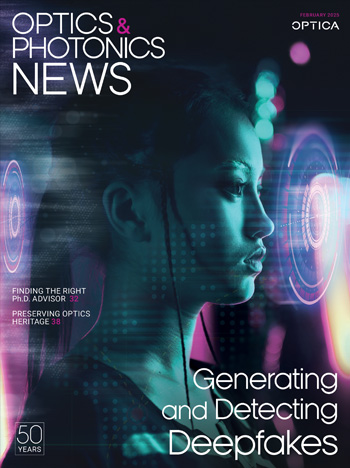
February 2011 Issue
Feature Articles
3-D TV and Movies: Exploring the Hangover Effect
New optical technology takes 3-D light-years beyond the cheesy effects of 1950s horror movies. Audiences flocked to Avatar—which set records for gross sales—and dozens of new 3-D films are in the works. In addition, 3-D televisions are being marketed as the next big thing in home entertainment. Yet a troubling question remains: Why does watching 3-D make some people sick?
by Jeff HechtComputational Nano-optics: Parallel Simulations and Beyond
Modern theoretical optics often delves into the interaction between light and nanomaterials of complex geometries, and it relies on heavy numerical simulations. This article explores recent breakthroughs in the areas of plasmonics and nanopolaritonics and then describes how to assemble your own supercomputer in order to gather data on nanoscale optics.
by Maxim SukharevMeet the 2011 OSA Fellows
The OSA Fellow designation is awarded to select OSA members who have made significant contributions to the advancement of optics. OSA is pleased to welcome 64 new Fellows into its membership.
by Belinda AcreDepartments and Columns
Optics Crosses the Andes
Although Chile is relatively small in population and geographic size, the country is quickly modernizing. It is making many important contributions to science, both locally and globally, and the field of optics is gaining momentum.
Lasers in Consumer Electronics: The Optical Pickup
The optical pickup is what recovers digital data from the encoded pits in optical storage devices such as CDs, DVDs and Blu-Rays. This article traces the past, present and possible future for this critical technology.
Marketing your Photonics Company in the 21st Century
Whether you’re an aspiring entrepreneur, a company president or a technical staffer angling to move into management, you need to know how modern marketing works.
Frequency Comb Pushes Limit of Fiber-Optic Strain Sensing
By integrating an optical frequency comb into a fiber-optic strain-sensing system, a team of Italian researchers has made a sensor that is three orders of magnitude more sensitive than existing instruments.
Retaining Talented Women Scientists: Time to Try Harder
Thirty years into her academic career, the author finds that the issue of women in science is much more complicated than she had initially thought.
New Technology Produces Real-Time 3-D Holograms
Researchers at the University of Arizona have combined a photorefractive polymer that can be refreshed every 2 seconds with a system of cameras, computers and an Ethernet link to provide a holographic version of Skype.
Lasers Sort Carbon Nanotubes
Researchers at Purdue University report that transient-absorption spectroscopy can be used to quickly sort nanotubes based on how they conduct charge.
Lighting Up the Inside of a Single Molecule
Researchers used luminescence spectroscopy and microscopy combined with STM imaging and tunneling spectroscopy to distinguish between vibronic couplings in orbitals in the same molecule.

![Illustration of a synapse in the brain. [Getty Images]](https://opnmedia.blob.core.windows.net/$web/opn/media/images/articles/2025/0425/departments/202504-cover-web.jpg?ext=.jpg)
![Fiber draped around a hand, demonstrating its flexibility. [Photo by Z. Wang and L. Wei]](https://opnmedia.blob.core.windows.net/$web/opn/media/images/articles/2025/0325/departments/202503-cover-web.jpg?ext=.jpg)
